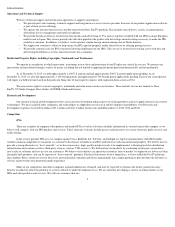TiVo 2015 Annual Report Download - page 21
Download and view the complete annual report
Please find page 21 of the 2015 TiVo annual report below. You can navigate through the pages in the report by either clicking on the pages listed below, or by using the keyword search tool below to find specific information within the annual report.
Table of Contents
We may be subject to legal liability for the provision of third
-
party products, services, content or advertising.
We periodically enter into arrangements to offer third
-
party products, services, content or advertising under our brands or in connection with our
various products or service offerings. For example, we license or incorporate certain entertainment Metadata into our data offerings. Certain of these
arrangements involve enabling the distribution of digital content owned by third parties, which may subject us to third party claims related to such
products, services, content or advertising, including defamation, violation of privacy laws, misappropriation of publicity rights and infringement of
intellectual property rights. We require users of our services to agree to terms of use that prohibit, among other things, the posting of content that violates
third party IP rights, or that is obscene, hateful or defamatory. We have implemented procedures to enforce such terms of use on certain of our services,
including taking down content that violates our terms of use for which we have received notification, or that we are aware of, and/or blocking access by, or
terminating the accounts of, users determined to be repeat violators of our terms of use. Despite these measures, we cannot guarantee that such
unauthorized content will not exist on our services, that these procedures will reduce our liability with respect to such unauthorized third party conduct or
content, or that we will be able to resolve any disputes that may arise with content providers or users regarding such conduct or content. Our agreements
with these parties may not adequately protect us from these potential liabilities. It is also possible that, if any information provided directly by us contains
errors or is otherwise negligently provided to users, third parties could make claims against us, including, for example, claims for IP infringement, publicity
rights violations or defamation. Investigating and defending any of these types of claims is expensive, even if the claims do not result in liability. If any of
these claims results in liability, we could be required to pay damages or other penalties, which could harm our business and our operating results.
Global economic conditions may impact our business, operating results, financial condition, liquidity or stock price.
Uncertainty about global economic conditions poses a risk as consumers and businesses postpone spending in response to tighter credit, higher
unemployment, financial market volatility, government austerity programs, negative financial news and declines in income or asset values. Additionally,
sovereign budget crises among members of the European Union and other countries worldwide have caused increased risk of default to holders of
sovereign debt, including commercial banks, and an unprecedented risk about the continuing viability of the Euro as a global currency. These conditions
have caused an unprecedented level of intervention from the U.S. federal government, other foreign governments, central banks and quasi
-
governmental
agencies such as the International Monetary Fund, decreased consumer confidence, overall slower economic activity and extreme volatility in financial
markets. While the ultimate outcome of these events cannot be predicted, these macroeconomic developments could negatively affect our business,
operating results, financial condition or liquidity in a number of ways. For example, if the economic downturn in any region makes it difficult for our
customers and suppliers to accurately forecast and plan future business activities, they may delay, decrease or cancel purchases of our solutions or reduce
production of their products. As many of our solutions are licensed on a per
-
unit fee basis and the pricing for future flat fee agreements may be predicated
on the then most recent unit sales volumes and financial health of our customers, our customers' decision to decrease production of their products or
devices, or curtail the offering of their services, may decrease our licensing revenue and adversely impact our operating results.
Furthermore, as our customers face a weak economy in various regions of the world, they may not be able to gain sufficient credit in a timely
manner, which could result in an impairment of their ability to place orders with us or to make timely payments to us for previous purchases. If this occurs,
our revenue may be reduced, thereby having a negative impact on our results of operations. In addition, we may be forced to increase our allowance for
doubtful accounts and our days sales outstanding may increase, which would have a negative impact on our cash position, liquidity and financial
condition. We cannot predict the timing or the duration of any economic downturn and we are not immune to the effects of general worldwide economic
conditions.
In addition, financial institution failures may cause us to incur increased expenses or make it more difficult either to utilize our existing debt
capacity or otherwise obtain financing for our operations, investing activities (including the financing of any future acquisitions), or financing activities
(including the timing and amount of any repurchases of our common stock or debt we may make in the future). Our investment portfolio, which includes
short
-
term debt securities, is generally subject to general credit, liquidity, counterparty, market and interest rate risks that may be exacerbated by any global
financial crisis. If the banking system or the financial markets deteriorate or remain volatile, the fair value and liquidity of our investment portfolio may be
adversely affected.
Finally, like other stocks, our stock price can be affected by global economic uncertainties and if investors have concerns that our business,
operating results and financial condition will be negatively impacted by a worldwide economic downturn, our stock price could decrease.
19
























